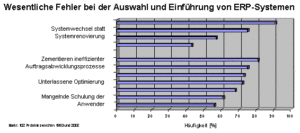from Ulrike Gloger
A market study examines the most common mistakes made when selecting and implementing ERP systems. Consultants recommend that SMEs take a step-by-step approach when selecting software.
If you don’t want to make any mistakes when selecting and implementing an ERP system, you should check your decision against the negative hit list compiled by management consultants Abels & Kemmner. The Herzogenrath-based company evaluated 102 ERP consulting projects in order to put a name to the error devils.
As the relevant ERP software houses report, potential customers are increasingly interested in the ROI (return on investment); in other words, they want to know when the costs of a new software project will pay off. However, as the management consultants Abels & Kemmner from Herzogenrath found out in their market survey of 102 ERP projects, 90% of the ERP systems in question did not compare their cost/benefit ratio. This is one of the reasons why in 80% of cases inefficient order handling processes were cemented and systems with too much complexity were installed.
Experience shows that only 15% of the available and paid-for functionality in ERP systems is actually used. According to Abels & Kemmner, a review of this decision by external specialists is therefore essential. According to other market studies, the average ERP user only rates the price/performance ratio of their ERP solution as 3.7, i.e. slightly better than just sufficient and therefore certainly not increasing efficiency or reducing costs. It was also found that two thirds of users either do not use a neutral consultant to help them select a suitable ERP system or use the system house itself or management consultancies with system specialization. “With such decision-making processes, however, no entrepreneur can arrive at a truly objective cost-benefit analysis, which should be a matter of course for an investment that often runs into six figures, even in SMEs,” says Dr. Götz-Andreas Kemmner from the management consultancy. Consequently, there is no way around a qualified and neutral ERP system selection. This is the only way to derive real business benefits from the investment.
The management consultants from Herzogenrath recommend that companies considering the purchase of new software for their business management processes should first design their future rational organizational processes. Based on this, a company should select suitable ERP systems in an initial selection stage. In a second selection stage, these were to be examined more closely on the basis of our own data. The functionalities must also be evaluated from a cost-benefit perspective before a decision can be made that also makes economic sense.
Abels & Kemmner
The focus is on SMEs
Abels & Kemmner GmbH was founded in 1993 by the engineers and economists Dr. Helmut Abels and Dr. Götz-Andreas Kemmner. The company focuses on streamlining value chains (supply chain optimization) for series and variant manufacturers as well as wholesalers. This primarily involves the design and optimization of order processing and logistics from suppliers to customers and from article assortment to IT support. Two supply chain concepts have already received best practice awards.
The second focus is on restructuring and earnings enhancement projects in the SME sector. A&K caused a sensation in 1997 when it founded the first virtual company made up of six medium-sized companies in the automotive supply industry.



